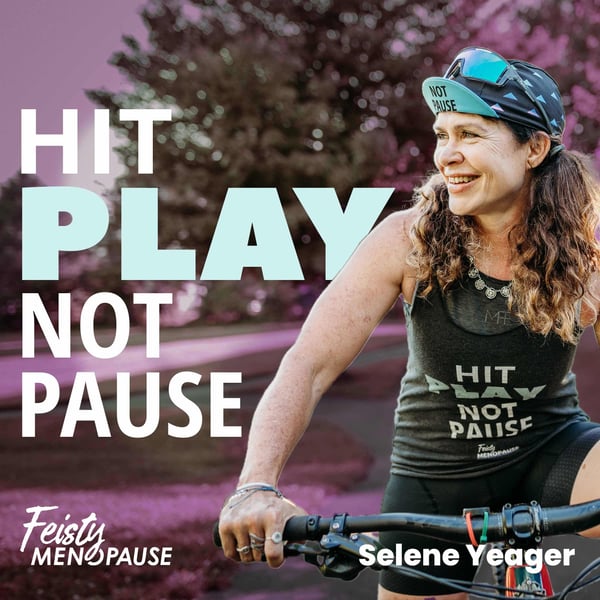What’s Inside Your Coronary Arteries? with Anita Vadria, MS, PA-C (Episode 182)
Hit Play Not Pause
Hit Play Not Pause
4.9 • 696 Ratings
🗓️ 12 June 2024
⏱️ 48 minutes
🧾️ Download transcript
Summary
Menopause and age raise our cardiovascular disease risk. Athletes and highly active people also tend to have a higher prevalence of coronary artery calcium and atherosclerotic plaque (though it tends to be the benign kind). But what does that all mean? How can we know what’s really going on in those coronary arteries of ours? To find out, host Selene Yeager had a Cleerly-enabled coronary computed tomography angiography (CCTA), which uses AI-enabled software to help characterize coronary plaque composition and cardiovascular disease risk. This week, she sat down with Anita Vadria, MS, PA-C, who is the Director of Medical Science Liaisons and Clinical Education at Cleerly to go over her results, talk about plaque and heart disease risk, and how technology is helping advance our understanding of our personal risk.
Anita Vadria, MS, PA-C, is the Director of Medical Science Liaisons and Clinical Education at Cleerly. She is a Board Certified Physician Assistant with a focus in Cardiology. She received her undergraduate degree in Molecular and Cell Biology and received her Masters in Physician Assistant Studies from Western University of Health Sciences in Los Angeles, CA.
Resources
Impact of atherosclerosis imaging-quantitative computed tomography on diagnostic certainty, downstream testing, coronary revascularization, and medical therapy: the CERTAIN study, here
Atherosclerosis Imaging Quantitative Computed Tomography (AI‐QCT) to guide referral to invasive coronary angiography in the randomized controlled CONSERVE trial, here
Coronary Artery Calcification Among Endurance Athletes “Hearts of Stone”, here
Physical Activity and Progression of Coronary Artery Calcification in Men and Women, here
Most heart attack patients' cholesterol levels did not indicate cardiac risk, here
Lipid levels in patients hospitalized with coronary artery disease: an analysis of 136,905 hospitalizations in Get With The Guidelines, here
2010 ACCF/AHA Guideline for Assessment of Cardiovascular Risk in Asymptomatic Adults
A Report of the American College of Cardiology Foundation/American Heart Association Task Force on Practice Guidelines, here
Heart attacks with no obvious risk factors on the rise, here
Enroll in our Navigate Menopause Course - https://www.feistymenopause.com/navigate-menopause
Subscribe to the Feisty 40+ newsletter: https://feistymedia.ac-page.com/feisty-40-sign-up-page
Follow Us on Instagram:
Feisty Menopause: @feistymenopause
Hit Play Not Pause Facebook Group: https://www.facebook.com/groups/807943973376099
Support our Partners:
Hettas: Use code FEISTY20 for 20% off at https://hettas.com/
Midi...
Transcript
Click on a timestamp to play from that location
| 0:00.0 | You are listening to Hit Play, Not Pause, a feisty menopause podcast for active performance-minded women. |
| 0:14.6 | I am your host, Celine Yeager. Each week, I bring you advice from athletes, scientists, researchers, and other experts to help you feel and perform you best, no matter what your hormones are doing. |
| 0:25.0 | This show is a production of Live Feisty Media. |
| 0:30.7 | Hello, strong feisty women. I hope you all are well. So let's talk heart disease, specifically the health of our arteries. |
| 0:40.4 | By now you've heard that your risk of heart disease can rise with menopause. |
| 0:44.8 | As our estrogen levels decline, it can be harder to keep cholesterol in check. |
| 0:49.4 | And women can see their LDL cholesterol, their triglyceride levels, and their blood pressure rise. |
| 0:55.0 | I've also seen some very recent research specifically on coronary artery calcium or |
| 1:01.0 | or CAC for short, which is essentially the amount of calcified plaque buildup in the arteries, |
| 1:06.0 | which is an underlying cause of cardiovascular disease events like heart attack and stroke. |
| 1:18.5 | Anyway, some researchers analyzed data from 579 postmenopausal women who were taking statins to control their cholesterol and who had also undergone two CAC scans at least one year apart. |
| 1:25.4 | And what they found was, when compared to men of similar age, they found that among women |
| 1:30.6 | with low to medium CAC scores to start with, their scores increased much faster than men. |
| 1:37.0 | In fact, their CAC increase was about twice that seen in men. |
| 1:42.1 | So postmenopausal women also appear vulnerable to a faster rise in arterial plaques. |
| 1:48.9 | And to make matters more confusing for menopausal women, the research on hormone therapy is also |
| 1:54.3 | mixed here. I'm not going to get into all of these studies in this intro. It would be too long. |
| 1:59.9 | I'll drop the studies in the show notes, |
| 2:01.6 | however, in case people want to check it out. But suffice it to say that even very recent studies |
| 2:06.6 | don't agree on the benefits and risks here. Though, if you do have a high risk for heart disease, |
| 2:13.7 | medical societies do recommend taking what they call a risk stratified approach to hormone therapy, |
| 2:19.3 | meaning the higher your risk, the more caution they recommend. |
... |
Transcript will be available on the free plan in -292 days. Upgrade to see the full transcript now.
Disclaimer: The podcast and artwork embedded on this page are from Hit Play Not Pause, and are the property of its owner and not affiliated with or endorsed by Tapesearch.
Generated transcripts are the property of Hit Play Not Pause and are distributed freely under the Fair Use doctrine. Transcripts generated by Tapesearch are not guaranteed to be accurate.
Copyright © Tapesearch 2025.

